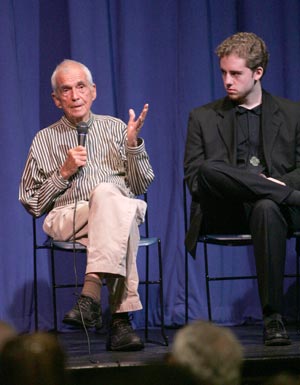
Photo by Bruce Gilbert
In what was a uniquely Fordham experience during the flurry of orientation events for freshmen, the newly arrived students had the opportunity to gain insight into the 1960s antiwar movement from Fordham Poet-in-Residence Daniel Berrigan, S.J.
Freshmen read Father Berrigan’s book,The Trial of the Catonsville Nine(Fordham University Press, 2004), and then spent an hour on Sept. 4 questioning the acclaimed writer and poet about fear, faith and protest.
“The virtue of war is that it anchors our faith or it destroys our faith,” Berrigan told the students. “There is no better place to resolve what we believe in than in war. Either we … go marching off to kill people, or we read the Sermon on the Mount: ‘Love your enemies and be good to those who do ill to you’ and later on … ‘Those who live by the sword, die by the sword.’”
Berrigan was one of the group of Catholics who came to be known as the Catonsville Nine. The nine men and women took 378 draft files from a draft board in Catonsville, Md., in 1968, poured homemade napalm over them and set them ablaze.
The act of civil disobedience was a flashpoint at the height of the Vietnam War, making headlines throughout the country. The Catonsville Nine were tried in federal court, found guilty and sentenced to three years in jail. Berrigan drew on court transcripts to write a dramatic account of the events that is at the heart of The Trial of the Catonsville Nine.
As part of the discussion with Father Berrigan at Pope Auditorium on the Lincoln Center campus, drama students staged an excerpt from the book.
After the staging, students asked Father Berrigan not only about Vietnam, but also about the war in Iraq. When a student asked the author if he thought something could be done to rouse “apathetic” students to protest the Iraq war, Father Berrigan told him that when the war started, he asked his students what they planned to do.
“And then I told them what I planned to do,” Berrigan said. “I told them, ‘I’m going to go with all my friends to the induction center at Union Square and block the doors—and you’re all invited.’ A number of students came and they’d never seen something like this before… . The upshot of all this is that they started thinking much more about issues of war and peace and conscience.
“That was very, very moving for me.”
